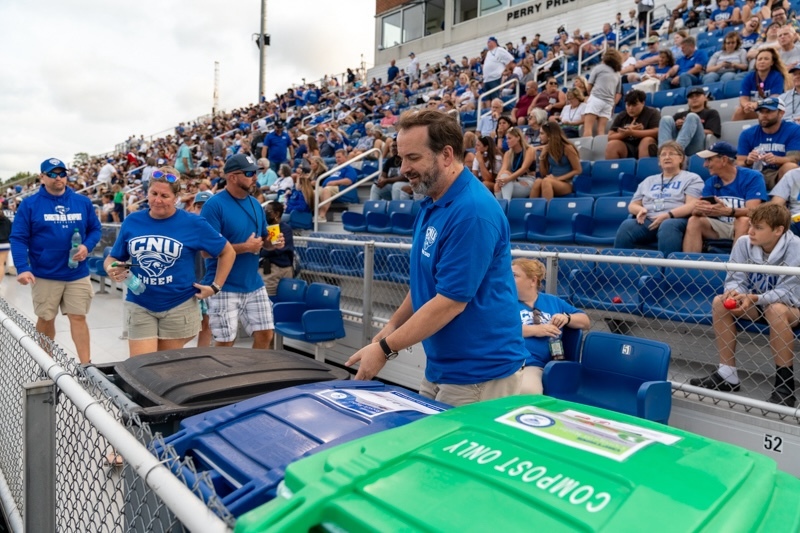
Read time:
Next time you’re devouring nachos at a Captains home football game, you could also be chipping in to help the environment.
Christopher Newport has begun a new program designed to divert at least 90 percent of waste generated at home games in TowneBank Stadium through recycling and composting. The ultimate goal is to reduce CNU’s reliance on landfills and promote sustainability on campus.
When you order at stadium concession stands this fall, the food and beverages will come served in more environmentally-friendly packaging, with many items converted to recyclable and BPI compostable options.
For example, the utensils provided with orders are now constructed from plant-based materials and are compostable, as are nacho trays, coffee cups, plates, and that unfinished pizza and other uneaten food items.
The effort is part of CNU’s Going Greener initiative that focuses on sustainability and reducing the school’s carbon footprint.
“We want people to realize that by doing it in the football stadium, hopefully they see they can do it in other parts of their lives and really make an impact,” said Brian Kelley, Sustainability Specialist at Christopher Newport. “We want to get people thinking about the sustainability aspect. It’s very important.”
Rachel Freeman, a student and Sustainability Ambassador with CNU’s Center for Sustainability in Education, is optimistic that the program will help people understand the importance of being good environmental stewards, especially while at sporting events with big crowds and lots of food and drink.
“The Zero Waste Football program is a very important initiative for CNU because it helps to build a culture of sustainability and eco-conscious consumerism within our community,” said Freeman, ‘25 Political Science. “At tailgates and football games, hundreds of people come together to enjoy food and drinks, time with family and friends, and celebrate our CNU pride, but with that comes a massive production of waste.”
New bins, marked with labels indicating what can be thrown in each, are set up at 12 locations throughout TowneBank Stadium. They are overseen by student volunteers who direct people to sort their waste into the proper receptacles.
Compostables are placed in the green carts and recyclables, such as empty bottles and cans, should be disposed of in the blue carts.
The compostables and recyclables will be picked up by two companies, NOPE Compost, Inc. and Bay Waste Disposal and Recycling. The compostable material will break down into organic material at an industrial compost facility in Waverly, Va., and will then be used as fertilizer. Recyclables will be processed at a material recovery facility, where plastic bottles will be sorted and sent for processing to be turned back into bottles or carpet. Cans will be sorted and recycled back into new cans.
“With zero-waste initiatives, football is a good place to start,” Kelley said. “In terms of education and reaching out to a larger group of people and spreading our message, football is a good avenue. We are hoping to create a culture of sustainability on campus and football is a good place to promote it.”
The effort at TowneBank Stadium is a starting point for a program that could grow over time to other parts of campus. It is a great way for CNU to be environmentally conscious and to do its part in keeping as much garbage out of landfills as possible, Kelley said.
“It sets the tone,” he said. “It shows we are committed to sustainability and everyone can be a part of the solution.”